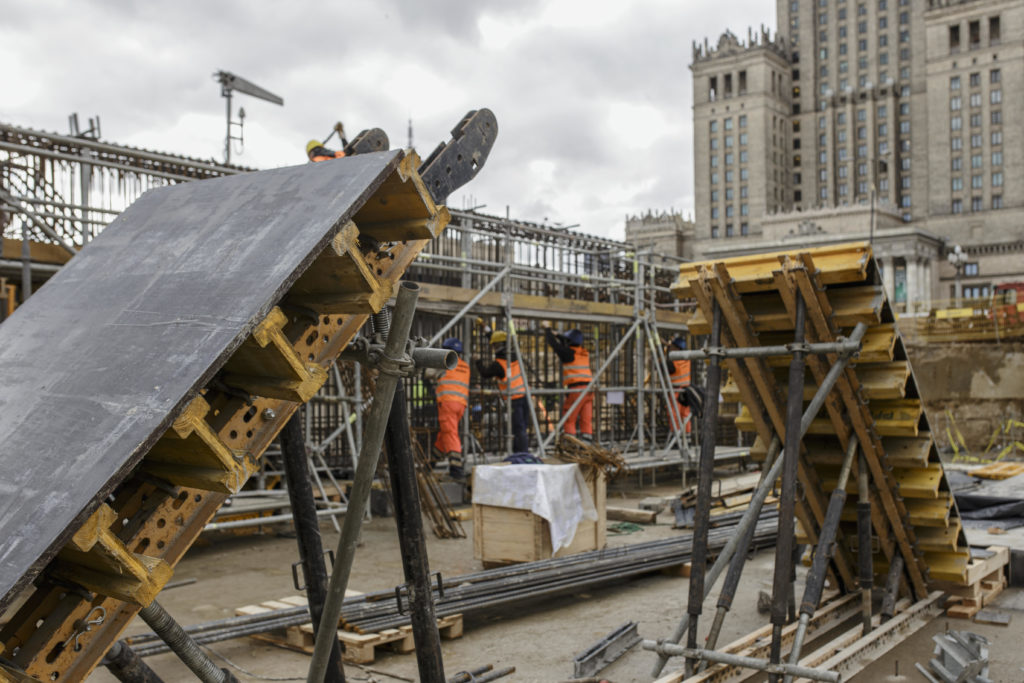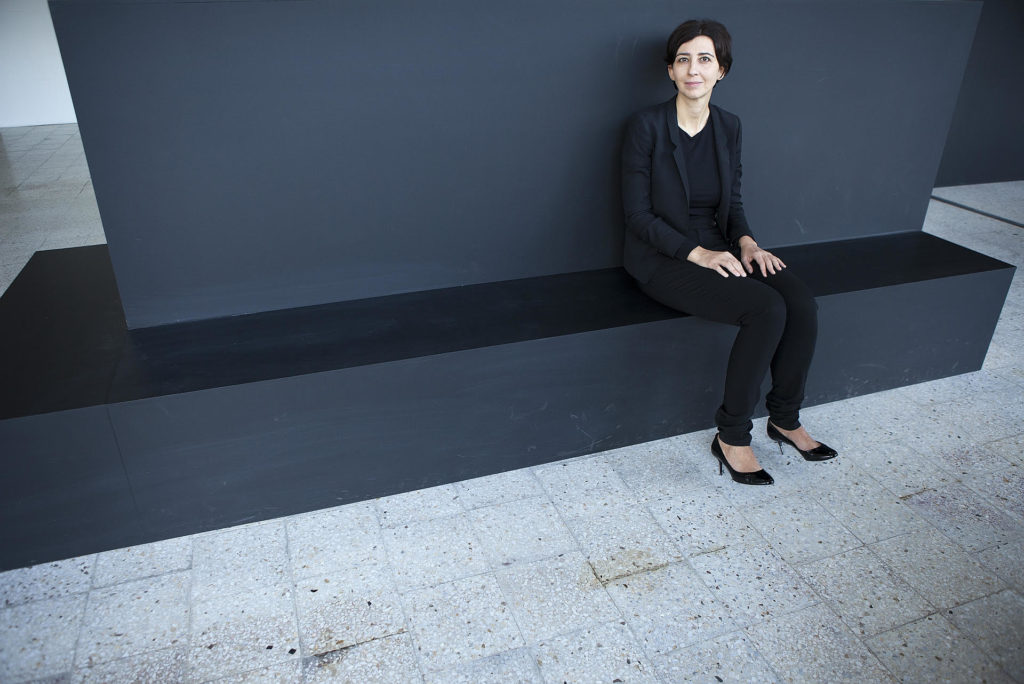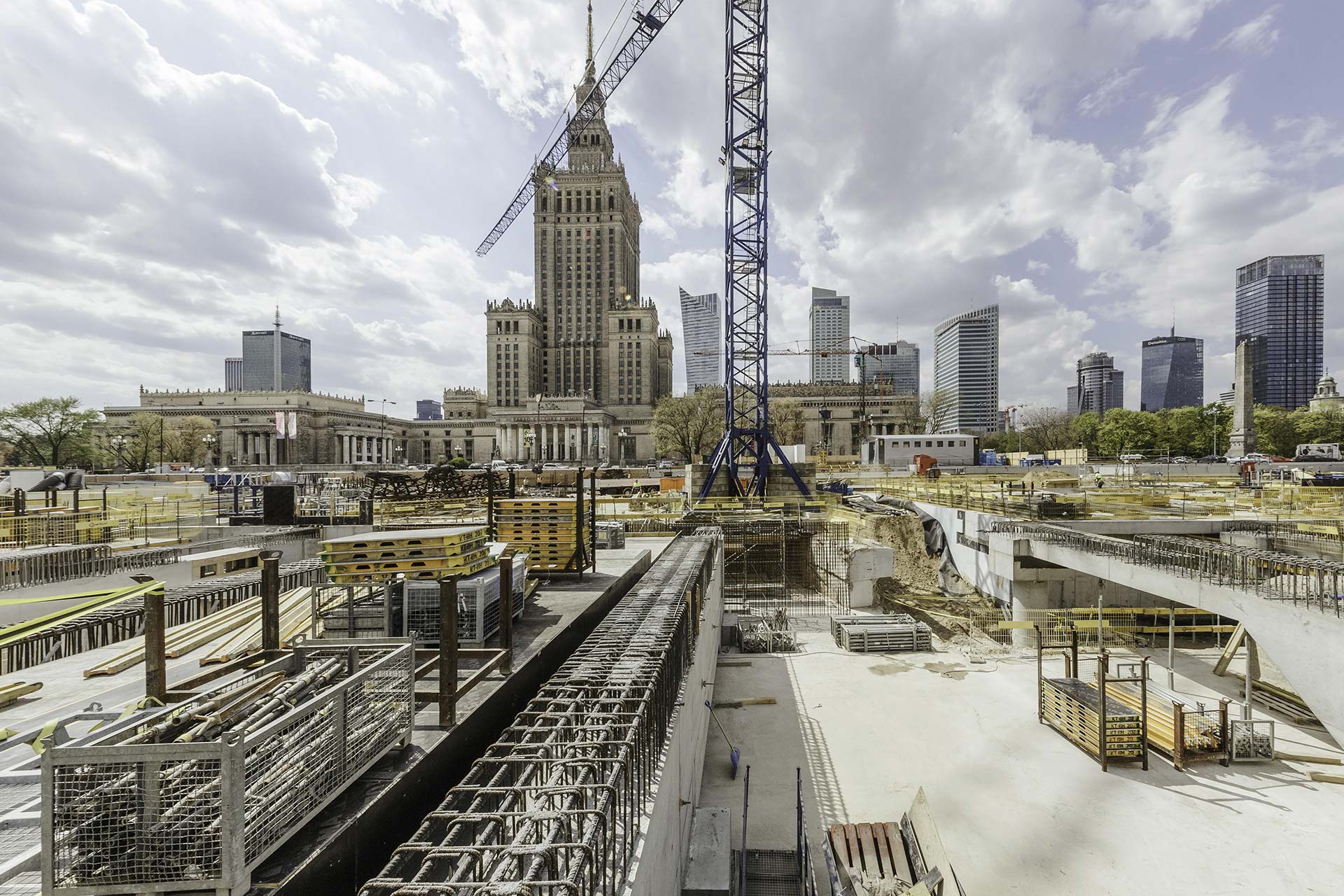Mike Urbaniak interviews
Joanna Mytkowska,
the Director of the Museum of Modern Art in Warsaw
‘’The Museum of Modern Art in Warsaw encourages independent contemplation and adapting the attitude of awareness of oneself and the planet”. But how can we contemplate when the world is on fire and soon we won’t be able to make ends meet?
JM: You quoted one of our subpages regarding the accessibility policy. It is meant to help you manage your fears during the pandemic. The current crisis doesn’t mean that we shouldn’t be aware of various needs, including the need to restore balance. Recently, our museum focuses on the crisis, however, it seems that more people still die of excessive consumption than of hunger.
It’s quite interesting that among the content we publish every day, you managed pick out something that irritates you. After all, in the time of crisis, being concerned about other people’s problems is the most important thing. This includes being concerned about people who work in the culture sector. This sector is plagued by precarious jobs and financial instability, which makes it particularly vulnerable in a time of crisis.
MU: I’m irritated precisely because I’m concerned.
JM: Then we need to realize that there is a systemic problem affecting many groups of people, not only artists. Many employees don’t have regular job contracts, and have lost their source of income and the feeling of social security. In Poland, cultural sector is based on the unstable system of grants and employing people on precarious contacts, rather than giving them regular ones. That’s the way almost the whole ‘third sector’ works. The crisis has bluntly revealed the flaws of our employment system. I dare say that this can get Polish culture in trouble, as the third sector, independent initiatives, and freelancing have a huge and diverse cultural potential.
MU: It seems that the government doesn’t share your concerns.
JM: The government probably thinks that culture equals cultural institutions. Of course, I wouldn’t like to see them collapse, as institutions play an important role. However, they are only fragments of a bigger picture. Institutions will be mostly affected by the loss of income coming from tickets and from renting space. It will make them even more dependent on grants.
MU: Everybody’s in trouble now. But the situation is much worse for ‘precarians’ than for employees of cultural institutions with regular job contracts.
JM: It’s true, but at least people are aware of this. I think that that in Poland, cultural institutions will be the last ones to reduce staff. I generally hope that there will be no such drastic measures as lay-offs in the public sector.
We can say many bad things about the government or the local authorities, but they keep on sending a clear message saying that they don’t intend to lay employees off. Rafał Trzaskowski, the president of Warsaw, said it outright that as long as it’s possible, there will be no cuts in cultural institutions, and that institutions are expected to become ‘channels of support’ for the whole artistic community. Of course, this solution will not stop the exclusion of artists and other people employed in the cultural sector from the employment system. But at least there’s something we can do.
MU: Are you taking any actions?
JM: The policy of keeping most commissions seems quite common. In each institution, apart from full-time employees, there are many people working on commission – designers, artists, and craftsmen representing many specialties. So far, I haven’t heard abouy any
lay-offs or cancelling commissions.
MU: So far.
JM: Of course, if the crisis continues and leads to budget reductions, the situation may get out of control. Institutions cannot just simply print out money. However, I do hope that such a terrible situation will never happen.
MU: The recent economic prognoses and decreasing tax revenue indicate that public financing will most likely be reduced.
JM: It might happen, but now there is no reason to doubt the government that assured us that it won’ t take away money once granted for culture. I remember the financial crisis that broke out 12 years ago. Out of the sudden we were asked to return a part of budget that had been granted to us, and we had to manage somehow. The whole language of it was different then. The neo-liberal doctrine that favors GPD over the well-being of employees seemed much more stable than it is now.
Institutions can survive if they receive support. People who have lost their jobs are in a far worse position. The institutional ‘duty’ and the redistribution of funds I mentioned earlier on are not enough. The problem exists not only in the cultural sector, and affects between 2 and 2.5 million people in Poland. The government should help them now, but should also come up with a system of support for the future.
MU: But it isn’t helping them much.
JM: The whole community is trying to lobby for solutions that have already been adapted by other European countries. First of all, relief funds should be introduced. Not for art, but for survival.
MU: The Ministry of Culture offers a one-off payment of 1800 zlotys.
JM: It’s something, at least, but it’s still something more like a prosthesis. It’s just like with the programme “Culture Online” and other initiatives. It needs to be said out loud. It needs to be said out loud that such solutions are temporary and insufficient.
Generally speaking, I believe that there should be a change in the philosophy of thinking about the problem, and the way we talk about it. We live in societies that are becoming increasingly interdependent. What’s matters now, is sustainable growth and making sure that everyone can be included in the system of social security. Economists argue if these goals ca be achieved by guaranteed minimum income or other forms of social protection. Anyway, we are still waiting for the system to change.
MU: But maybe it’s only you who thinks that the system in Poland should change?
JM: I’ve also been thinking that. I can’t understand why, as a society, we accept this model and allow to be treated badly. However, things that you and I find right and necessary, can be viewed in a different way by many other Poles.
MU: Can people representing culture be the ones to blame?
JM: In what sense?
MU: In a sense that, for many years, they were unable to create an active, influential organization. As you know, authorities only make concessions when pressured.
JM: Some, like filmmakers, managed to do it. However, their strength came from huge amounts of money provided to them by the Polish Film Institute. I don’t think that other artists just sit and watch, although their successes are relatively less spectacular. It’s true that the artistic community is prone to naivety, animosities, and shortsightedness. However, artists from each area of art have their own organizations.
MU: Organizations that can do nothing, apart from sending letters of protest.
JM: I have to remind you that the Citizens of Culture contributed to ‘’The Pact for Culture” signed by the Prime Minister Donald Tusk. It’s true, though, that the overall context and money were completely different then. Today, we fight for the rights of employees. But ok, I gave to admit that we, amateurs, used to do it only in our free time. And one more thing. You mentioned pressuring. I’m not sure if this way of functioning makes sense at all. Do we really want to live in a world where the authorities listen to people only when they feel under pressure? I’m not so sure.
MU: But that’s the way the world works, whether we like it or not.
JM: Unfortunately, it’s only an illusion. If it works out anywhere at all, it’s only in societies with a well-functioning form of social contract. It’s true, however, that the world of culture in Poland has too few professional organizations that stand for the rights of artists. In addition, as far as the rights of employees are concerned, any change requires action from outside the world of culture. One example of such action was including contracts of mandate into Social Security system, so that employees can now go to see a doctor without charge.
We also need to look at the organizations formed by artists in a longer perspective. As a community, we fought for the autonomy of art, and then for the possibility to create it. I can say that, to large extent, we made it. Today Poland has cultural infrastructure that allows to create art on a high European level. We can consider it an achievement of our community.
Now is the time to define new goals. One of them is including artists and people employed in the sector into a decent employment system. It should be done not only for this one particular group, but for precarians of all trades. Maybe labour unions could help, particularly the Worker’s Initiative that is so popular in cultural sector. As an employer, I will support such changes. We have to act, and not just complain and express increasingly extreme opinions. Although I’m not quite sure if it’s an easy task. A recent Zoom debate organized by our museum clearly showed that the problem is real. It was a debate between municipal authorities and community activist. Although they all came from similar backgrounds and understood the situation well, it was difficult for them to find common ground.
MU: What kind of action can the museum you run take?
JM: First of all, we will try not to make staff redundant and to continue the commissions of as many employees as we can. Secondly, together with artists we agreed to suspend the autumn exhibition season. In a crisis so severe, supporting the artistic community is far more important than holding exhibitions. As a part of our this year’s action ‘’Warsaw under Construction”, we intend to create a platform for the redistribution of funds. We have a budget of 500 thousand zlotys. It’s not much, but we will still be able to use this money to support a number of artists. Thirdly, we engaged in a dialogue with municipal authorities to negotiate some issues connected with rents, studios, and financial aid for artists.
We need to have a serious conversation about the overproduction and
‘post-growth’. I believe that the situation requires us – aside from taking ad hoc measures– to redefine our long-term goals. There’s a need for a new balance between creating content and the needs of the audience, artists and, the widely defined community. We are starting to debate this with professionals and theoreticians. We want to use this difficult time to carry out a ‘makeover’ of our policy.

MU: The museum will be providing aid instead of preparing exhibitions?
JM: We are open for the new needs that time brings. Giving temporary aid can be more important than holding exhibitions. It’s just like when during World War II, a museum in Malmö gave shelter to refugees. As a matter of fact, when the pandemic began we offered one of our pavilions that oversees the Vistula river for a quarantine isolation space. It turned out that it was impossible due to insufficient sanitary facilities.
MU: People in Poland don’t seem to understand those who work in the cultural sector. Some online comments read that it’s high time they started some ‘real’ work. Why do we think about artists as freeloaders?
JM: It all stems from the surprisingly effective communist propaganda of Gomułka. It has lasted for decades, just like some other ideas of comrade Gomułka. On the one hand, the cliché image of a romantic artists that should be treated in a special way is still widespread. At the same time, people call artists freeloaders. The truth is that there is no problem with artists, but with employment system.
MU: What should we do then?
JM: As you may guess, I have no perfect solution. For now, we need to fight to maintain what’s already there. We also need to support the community and lobby for changes in the precarial system of employment, also in other sectors. This might be a long process, and I realize that people that are broke can find this quite irritating. I just simply hope that the current crisis will accelerate changes.
MU: COVID-19 has ravaged the world of art and turned it upside down. World’s major museums keep reducing the number of employees. Many exhibitions planned for years have been cancelled. Art fairs and biennales are being postponed. Will the pandemic bring any permanent changes?
JM: I wish it could happen. I wish that the coronavirus could become the reason for making changes in the world of art suffering from overproduction. I would like such changes to be significant. We are definitely experiencing a crisis of the very formula of biennale, which is connected with the overproduction I already mentioned. However, it is also connected with ‘overtravelling’. This will end, an least temporarily, and perhaps reborn in a new form, perhaps with focusing on local art scenes. Or maybe it’s only wishful thinking? Manuel Borja-Villel, director of Museo Reina Sofía, said some time ago that humanity could not think of anything more terrifying than blockbuster exhibitions.
MU: No good news?
JM: At a time of a great crisis, there is always room for introducing changes that everyone considered necessary, but there was no determination to introduce them.
MU: And what if this crisis turns out to be so severe that we will only worry about keeping our fridges full?
JM: Then the situation will remain the same, though worse. It is time now to re-think the model of functioning based on consumption and excessive speed of production. Maybe it’s about the time we started thinking about a radical change. As the Museum of Modern Art, we wish to participate in this collective reflection.
I want to stress that I find the rise of populism and turning away from rationality much more scary than the epidemic. After all, we already have tools necessary to solve many burning issues, we just don’t use them.
MU: Over the last weeks we’ve been flooded with online art events, including dozens of virtual exhibitions. Do you think they bring new quality?
JM: No, not really. The Internet will surely maintain its position as the basic tool of communication, meetings, and exchange of ideas. However, I can’t see any changes in quality. Institutions and individuals that were active online before just simply intensified their web presence. There’s some massive overproduction and over-presence. We should remember that the Internet can be excluding at times. I will not even mention problems like content manipulation or copyright infringement. I really do hope that this flood of internet content will raise our awareness. After all, the Internet is likely to stay with us forever.
MU: Just like fresh air . Do you think that the role of outdoor exhibitions will change? The Park of Sculptures you’ve been creating for years in Bródno will be the cure?
JM: It will definitely be one of safe meeting spots. But we also offer a great outdoor venue located close to our pavilion near the river. Soon, we will add temporary roofing. We will hold public events there. There’s also the Hansens’ House in Szumin. It located next to a river, and surrounded with meadows and forests. It’s a perfect environment for preparing small-scale events and catching some breath. We will invite the audience there in near future.
MU: And is the building in the Parade Square still under construction?
JM: Yes, it is. Construction companies have been working all the time. We have just finished the fundaments, and are about to start with the ground floor. We were so overwhelmed by the heroism of the construction team, that we even asked Rafał Milach to take photos of their tremendous work.
MU: Artists are lamenting their fates, but the Museum of Modern Art continues to grow.
JM: I’m sorry that the museum is being constructed in a time of such a tremendous crisis.






